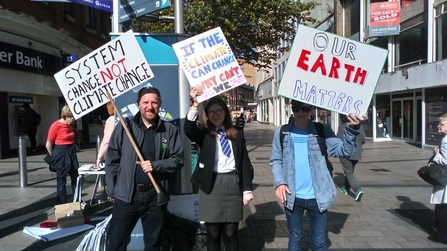A Climate Change Act for Northern Ireland – where are we now?
Unsplash
As both Bills were, in January, at the same legislative stage, with limited time left for the current Assembly’s mandate (due to finish in March 2022), the departmental Bill (‘Climate Change (No. 2) Bill’) takes precedence over the Private Members’ Bill (‘Climate Change Bill’). At Consideration Stage, the Assembly debates the Bill along with all amendments that have been tabled prior to the debate. The first of these debates took place in early February 2022, with a notable vote in favour for an amendment to the overarching emissions reduction target, calling for net zero by 2050. The second debate of amendments was completed on 7th February, with the Bill now moving to Further Consideration Stage, which provides a second opportunity to amend Bill (only amendments, not clauses or schedules, can be debated). The amendments and debate are available here, which should include the reprinted Bill following Consideration Stage amendments.

Unsplash
It is important that the Bill provides the legal framework to drive positive action bespoke to the needs of NI which is fit for purpose for future generations, who will be left to deal with the impacts of climate change.
A number of key amendments have now been debated and agreed, including Just Transition measures, especially relevant to sectors such as agriculture which are required to deliver multiple benefits – a healthy environment and food security. Of significant interest to us are amendments to “require government Departments to have regard to the desirability of utilising and supporting nature-based projects to "protect, restore or sustainably manage ecosystems in order to promote both human well-being and biodiversity or provide other environmental, social and economic benefits", when developing their proposals for meeting emissions targets””. This has been proposed across three amendments, with the first amendment (number 38) having the wording:
“In deciding its proposals and policies for the purposes of section 16, each Northern Ireland department must also have regard to—
(a) the just transition principle (see subsection (3)), and
(b) the desirability of using and supporting nature-based projects (see subsection (4)*), whether alone or together with other types of action.
*“Nature-based projects” are projects to protect, restore or sustainably manage ecosystems in order to promote both human well-being and biodiversity or provide other environmental, social and economic benefits.”
A supplementary definition – amendment 47 - was agreed on 7th February that “Policies and proposals under section 16 shall as far as is practicable, support nature based projects that enhance biodiversity; protect and restore ecosystems; and seek to reduce, or increase the removal of, greenhouse gas emissions or support climate resilience”.
Another key recommendation from the AERA Committee was for the “facilitation of a comprehensive Land Use Strategy in NI, with a view to identifying areas for carbon sequestration.” This amendment hasn’t been upheld, with ministers referring to ongoing work on an Environment Strategy, Peatland Strategy, Green Growth Strategy and incoming agricultural land management strategy, including a soil nutrient health scheme, covering what may have fallen under a Land Use Strategy.
Following last week’s news of the resignation of DUP’s First Minister Paul Givan we appreciate that many of our supporters are concerned about the impact of this on achieving a Climate Change Act within this government’s mandate. New legislation for the devolved administration of NI has been passed which will mean that all legislation already laid before the Assembly can continue its progress, and the Climate Change (no. 2) Bill has now concluded its Consideration Stage this past week.
Implementation of the UK Environment Act –
a Northern Ireland ‘Commencement Order’
Another key piece of legislation that must be approved by the Assembly in the next few weeks is the UK Environment Act (2021) ‘Commencement Order’, which enables provisions for Northern Ireland by the Environment Act to be enacted here. This is particularly important as the Commencement Order will enable the Office for Environmental Protection to cover Northern Ireland, holding government and other public bodies to account. It will commit Northern Ireland to implementing and reporting on an Environmental Improvement Plan, and ensure a number of ‘Environmental Principles’ are embedded that will need incorporated into all future policies and planning decisions:


School strike 20 Sept 2019
What can you do?
Contact your MLA, asking them to do everything possible to support the urgent passage of the Climate Change (no. 2) Bill over the coming weeks to ensure it becomes law before the Assembly is dissolved. Without the legal framework of a Climate Change Act there will be unacceptable delays in climate action across all sectors. A Climate Emergency was declared by the NI Assembly over two years ago, and it is vital that the necessary legislative framework is in place this year to safeguard the future of both wildlife and people.
We welcome the nature-based projects amendments to the Climate Change Bill (amendments 38 and 47), which is essential to ensure we make the most of the potential for nature to help us in climate change mitigation and adaptation, as well as in addressing the biodiversity crisis. In NI we are well behind the rest of the UK in peatland restoration which is an important part of our net zero journey and we hope that the Peatland Strategy will also be approved before the Assembly rises.
Finally, we would ask MLAs to ensure that the Commencement Order for the UK Environment Act is secured within the next few weeks – this is crucial for future protection and restoration of our natural environment and critical for the health and well-being of the local communities across NI.

